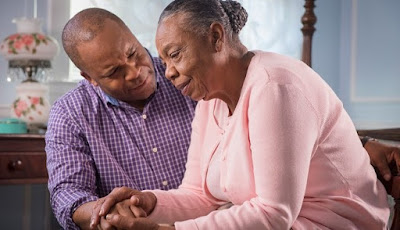The Coronavirus is presenting a serious worldwide public health threat, and older adults and people with chronic health conditions are at a higher risk of becoming seriously ill from the virus. The coronavirus pandemic has caused family caregivers to feel more anxious about their senior loved ones’ health and safety — especially when some senior adults are rejecting changes to their behaviors to protect against contracting COVID-19.
However, there are ways family caregivers can protect elderly loved ones and help them understand why coronavirus is a cause for concern.
Get the Facts About COVID-19 And the Elderly
Before talking to your older loved ones about COVID-19, you should arm yourself with facts and information from reliable sources, such as the Centers for Disease Control and Prevention or state and local health departments.
Providing them with information from a healthcare provider or community organization is an effective way to boost credibility. You should also correct any misinformation that may be driving their inaccurate beliefs or behavior.
Understand Seniors’ Position About COVID-19
To help your elderly loved ones realize the seriousness of COVID-19, you need to uncover the reasons behind their behavior — and the best way to do this is by asking questions. You might start by asking them what they have heard about COVID-19, what they think about the pandemic, and what they have done to prepare.
What you learn might surprise you. For example, a senior who is coping with cognitive decline may not understand or remember information they hear about COVID-19 and forget to follow essential safety precautions.
Older adults may incorrectly believe the virus won’t affect them because they are in good health, aren’t THAT old, have “survived worse,” or never get sick. Some older adults may not understand how their refusal to follow public health guidance could contribute to the spread of the virus — or, they could simply be reluctant to take orders from the government or their loved ones.
It’s also vital for family caregivers to remember a senior’s reason for failing to take COVID-19 seriously could be related to other factors, such as fear of isolation, concern over changing routines, or anxiety over an uncertain situation.
Whatever the cause, learning more about the reasons behind your loved one’s stubbornness can help you develop the best persuasion strategy.
Make Your Case
When making your case, it’s critical to use the right tone and approach. Pressuring, badgering, or talking down to your elderly loved ones could make it less likely they will listen to your advice. Make sure you let them know you aren’t trying to upset them and are only concerned about their health and safety.
Make sure you address their specific concerns as much as possible. For example, if your loved ones are concerned about losing touch with family members, you could help them develop a plan to keep in touch and provide them with creative ways to communicate during social distancing. If they are concerned about missing their favorite activities, you could help them research safe alternatives or find new ways to stay active during the coronavirus pandemic.
If they have concerns about being able to take care of themselves or obtain supplies during lockdowns, you could arrange for qualified home care workers to provide essential services during the coronavirus if they need help with daily activities.
You could also mention the steps that you, or someone your loved ones know and respect, have taken to prepare or comply with public health guidelines.
Be Open to Two-Way Communication
No matter how your older loved ones respond, it is essential that you avoid harming your relationship. Simply let them know you will be available to help them and answer any future questions they may have.
Part of protecting your older loved ones during the COVID-19 pandemic means doing your best to help them understand the seriousness of the situation and teaching them how to keep themselves — and others — safe.
If you’re interested in more information about how in-home care services can help your elderly loved ones, contact Visiting Angels Newton/Canton today.
About Visiting Angels Newton/Canton:
Visiting Angels Newton/Canton MA is an award-winning local home care agency providing high caliber in-home living assistance to the elderly and people with disabilities. Countless families have benefited from our home Alzheimer’s care, dementia care, elderly companion care, respite support, transitional aid, and home care services in Stoughton, Canton, Westwood, Norwood, Brookline, Watertown, Needham, Dedham, Natick, Wellesley, Newton, Chestnut Hill, Roslindale, and nearby towns. While primarily personal in nature, the senior home care provided by Visiting Angels Newton/Canton can make a significant impact on your loved one’s happiness and quality of life. Contact us today for a free in-home consultation!
We are staying Diligent
As the confirmed cases of COVID-19 continues to rise in our area, we are monitoring the situation and the advice from public health authorities. Visiting Angels Newton/Canton remains committed to our responsibility as your senior home care provider during this time. We recognize that our Visiting Angels home caregivers allow seniors to age safely and comfortably in their own homes, wherever that may be, and that some of our clients cannot get through the day or night without a home care aide. We want to assure you that we are communicating to our caregivers to follow best practices, including hand-washing, and staying home if they are feeling ill or have traveled to Level 3 CDC countries.
